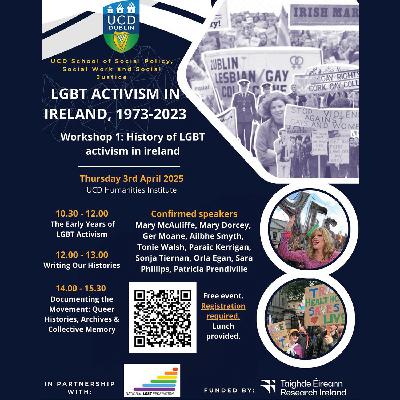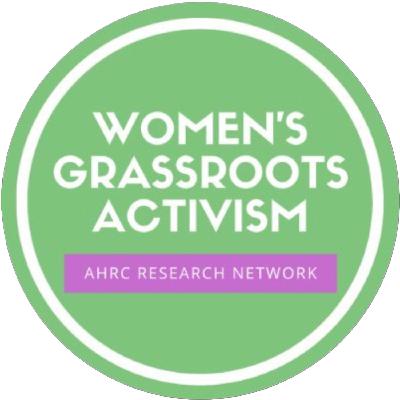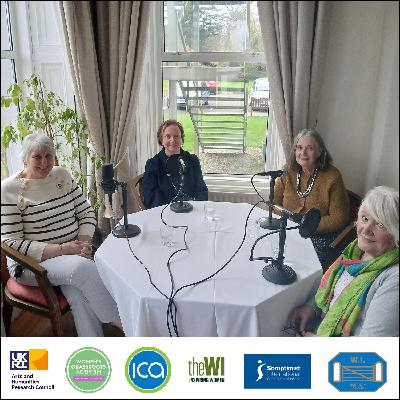Discover History Hub
History Hub

History Hub
Author: History Hub
Subscribed: 435Played: 2,390Subscribe
Share
© Copyright 2011-2025
Description
History Hub is for everyone who loves history. This podcast series is a collection of academic podcasts on a plethora of historical subjects. It ranges in scope from full recordings of academic research papers to informative contributions from professional historians discussing the details of specific historical events. Funded by UCD School of History, the series is a partnership with University College Dublin's History Hub website and multimedia hub.
174 Episodes
Reverse
This episode features the renowned playwright and poet Frank McGuinness who gave a paper entitled "Living With Mortality - A Short Stay in Switzerland" on February 25th 2010 in the UCD Humanities Institute. Frank spoke about the issue of mortality as treated in drama from Greek theatre to contemporary work, including his adaptation of Henrik Ibsen's Ghosts and his screenplay for the widely acclaimed and BAFTA nominated BBC drama "A Short Stay in Switzerland" which tells the story of Dr Anne Turner who chose to end her life in a Dignitas clinic in Switzerland in January 2006.
John Coakley's (UCD) keynote at Partitions and Borders - a comparative and interdisciplinary conference jointly organised by UCD and JNU which took place in UCD in 2018.
'The Origins and Importance of the GAA', episode 6 of 'Sport and Ireland: A History', with Prof. Paul Rouse. First recorded for Newstalk and published on History Hub in 2022.
This podcast was recorded at workshop 1 of LGBT Activism in Ireland, 1973-2023 - Looking Back, Going Forward. The project comprised of two workshops which were organised by Mary McAuliffe (Director, UCD Gender Studies), in partnership with the National LGBT Federation (NXF), and funded by Research Ireland New Foundations award. This podcast on the early years of LGBT Activism in Ireland featured poet Mary Dorcey (ISLM), psychologist and activist Ger Moane, Tonie Walsh (Irish Queer Archive), activists Ailbhe Smyth and Patricia Prendiville (ILGA-Europe), and Mary McAuliffe (UCD Gender Studies).
This podcast was recorded at workshop 1 of LGBT Activism in Ireland, 1973-2023 - Looking Back, Going Forward. The project comprised of two workshops which were organised by Mary McAuliffe (Director, UCD Gender Studies), in partnership with the National LGBT Federation (NXF), and funded by Research Ireland New Foundations award. Panel 3 was on 'Documenting the Movement. Queer Histories, Public and Personal Archives, Collective Memory' and featured: Paraic Kerrigan (UCD), Orla Egan (Cork LGBT Archive), Sara Phillips (Irish Trans Archive), Mary McAuliffe (UCD) and, Tonie Walsh (Irish Queer Archive). The panel was chaired by Ruth Baldacchino from UCD.
This podcast was recorded at workshop 1 of LGBT Activism in Ireland, 1973-2023 - Looking Back, Going Forward. The project comprised of two workshops which were organised by Mary McAuliffe (Director, UCD Gender Studies), in partnership with the National LGBT Federation (NXF), and funded by Research Ireland New Foundations award. Panel 2 was on 'Writing our Histories' and featured: Paraic Kerrigan (UCD), Sonja Tiernan (Irish Humanities Alliance) Orla Egan (Cork LGBT Archive) Sara Phillips (Irish Trans Archive). The panel was chaired by Morgan Wait from UCD.
This podcast was recorded at workshop 1 of LGBT Activism in Ireland, 1973-2023 - Looking Back, Going Forward. The project comprised of two workshops which were organised by Mary McAuliffe (Director, UCD Gender Studies), in partnership with the National LGBT Federation (NXF), and funded by Research Ireland New Foundations award. This podcast on the History of LGBT Activism in Ireland featured poet Mary Dorcey (ISLM), Tonie Walsh (Irish Queer Archive), activist Ailbhe Smyth and Mary McAuliffe (UCD Gender Studies).
In the final episode of 'Recording the Revolution', Conor and Harlan return back to the archive and pluck their final tape, which is Harlan's interview with Irish politician and managing director of the Abbey Theatre, Ernest Blythe. Ernest Blythe reflects on his early years in the IRB, the role he played in the Free State's execution of Anti-treaty IRA members and his views on the partition of Ireland. Ernest Blythe was interviewed on 13 March 1972.
In this week’s episode of 'Recording the Revolution', Conor and Harlan are discussing Harlan's fascinating interview with Maire Comerford. One of two women who were interviewed by Harlan, Maire played a highly active role in the Irish revolution and can be described as one of the more radical, committed, and persistent revolutionaries from this period. Maire Comerford was interviewed on 14 March 1972.
In this week's episode of 'Recording the Revolution', Conor and Harlan are taking a look at Harlan's interview with James M Dillon, the former leader of Fine Gael from 1959 to 1965 and son of the Home Rule MP John Dillon. James Dillon sheds light on what life was like during the Irish Revolutionary period and talks about his time spent in the Dail from the 1930s onwards. James Dillon was interviewed by Harlan on 17 March 1973.
In this week’s episode of 'Recording the Revolution', Conor and Harlan pluck their second tape from the archive and discuss Harlan's illuminating interview with the printer of the Proclamation of the Irish Republic, Christopher "Christy" Brady. Christopher Brady reminisces on his time spent in Liberty Hall, his conversations with James Connolly and the secrecy surrounding the printing of the Proclamation. Christopher Brady was interviewed on 26 March 1972.
In this episode, a recording of Holocaust Education Ireland's Annual Holocaust Annual Memorial Lecture for 2025 by Prof. Anthony McElligott
In this final episode, Dr Anna Muggeridge, Deirdre Connery of the Irish Countrywomen's Association (ICA) and Joan Houston of Soroptimist International Great Britain and Ireland (SIGBI), Northern Irish Federation, discuss crafting and 'craftivism' in the ICA and SIGBI. We consider the importance of crafting to women historically and today, how these organisations have promoted and celebrated women's craft skills, and importantly the ways in which 'craftivism' has been used by women's organisations to raise awareness of complex and challenging issues and to engage in activism.
In our first episode of Recording the Revolution, Conor and Harlan sit down with Catherine O’Mahony, a producer at Scratch Films. Catherine and Aine O'Neill were working on a project several years ago when a source, Jim Dolan, told them about an interview transcript in his attic. Within days, Catherine and Aine had tracked down the interviewer Harlan Strauss and flew to Berlin to meet him, starting a new chapter in the history of the tapes at the centre of this podcast series. In this episode Conor and Harlan take a look at the extraordinary life of 'the Blacksmith of Ballinalee”', General Seán MacEoin who was a key military leader in both the War of Independence, and on the side of the Free State in the Civil War. Seán MacEoin was interviewed by Harlan on 16 March 1972.
In this episode, series editor Heather Delaney talks to historian Dr Conor Mulvagh and finds out all about the Harlan Strauss tapes and why they are such an important archive.
In this episode, Dr Anne Logan, Chrissie Booth, Vice-Chair of the National Federation of Women’s Institutes (NFWI), and Lorna Blackmore, past regional President of the Soroptimist International Great Britain and Ireland (SIGBI) Southeast Region, discuss the myriad ways in which women’s organisations have campaigned, and continue to campaign, to protect and improve the natural environment. Topics we discuss include the formation of the iconic ‘Keep Britain Tidy’ campaign by the NFWI in 1954 and the current NFWI campaign for ‘clean rivers for people and wildlife’. We also discuss SIGBI support for ‘toilet twinning’ and for solar-powered cooking devices to reduce deforestation and hopes for a future less dependent upon single-use plastic items.
In this episode, Dr Ruth Davidson, Caroline Auckland, former President of the Tunbridge Wells and District Soroptimists Club, Kent, and Eadaoin Lawlor, national past President of Soroptimists Republic of Ireland discuss how Soroptimists have campaigned to end Violence Against Women and Girls (VAWG). We consider the ways this work is achieved through advocacy and campaigns around policy and education at local, national and global levels. We also discuss campaigns including the ‘Safe Home Safe Community Project’ and how SIGBI supports the United Nations ‘Orange the World’ campaign, launched in 2008 to end violence against women and girls.
In this episode with Prof Caitríona Beaumont, Margaret Broome, former chair of the Federation of Women's Institutes of Northern Ireland (WINI), June Lawless, National Secretary of the Irish Countrywomen’s Association (ICA) and Dr Anne Logan (University of Kent and Women's Institute member) chat about what membership of a women’s organisation means to them. We also discuss the history of co-operation and friendship between the ICA, WINI and the NFWI since 1918 that illuminates new understandings of Anglo-Irish relations in the twentieth century.
The first episode of the Women's Grassroots Activism Podcast with Prof Caitríona Beaumont, Mary D'Arcy, President of the ICA, Breda Cahill, ICA Wexford Federation President and Deirdre Connery, member of Duncannon, Co. Wexford ICA guild, was recorded at An Grianan, Co. Louth. The ICA's An Grianan is Ireland’s first residential adult education college and opened in 1954. In this episode we chat about the history of the ICA and its activities over the past 100 years to learn more about the contribution of this national women's organisation to Irish history, Irish society and to the everyday lives of women in Ireland.
In this episode, 'St Brigit and the beginnings of Irish history' a panel discussion organised by UCD's Dr Fionnuala Walsh UCD for International Women's Day 2024.










